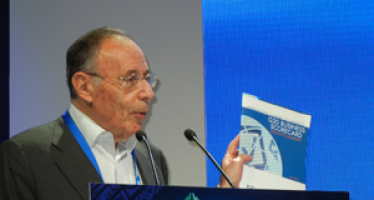Brazil’s World Cup Host Cities Will Have Additional Funds for Investing in Tourist Infrastructure
 Resources from the Ministry of Tourism will be used for implementing tourist information centres, as well as putting up street signs and accessibility related construction works.
Resources from the Ministry of Tourism will be used for implementing tourist information centres, as well as putting up street signs and accessibility related construction works.
Less than seven hundred days away from the beginning of the 2014 World Cup, the Brazil Ministry of Tourism announced a tourist focused capital reinforcement for the tournament’s host cities. R$ 110.6 million ($55 million) has been allocated for tourist infrastructure related construction works in the World Cup’s 12 host cities.
Another R$ 10 million ($5 million) in matching funds will be added to the investment, as financial matching for actions taken by state and municipal governments.
The resources will be allocated to projects for the implementation of Tourist Information Centres (CATs), putting up tourist signs and accessibility related construction works in the cities’ tourist sites. These three funding categories are part of the federal government’s preparation related commitments for the 2014 World Cup, which will be delivered by the ministry.
The resources were allocated in the following manner: Belo Horizonte (R$ 5.62 million), Brasilia (R$ 3.49 million), Cuiabá (R$ 3.31 million), Curitiba (R$ 8.57 million), Fortaleza (R$ 17.43 million), Manaus (R$ 1.84 million), Natal (R$ 17.58 million), Porto Alegre (R$ 11.29 million), Recife (R$ 14.97 million), Rio de Janeiro (R$ 17.92 million), Salvador (R$ 7.69 million) and Sao Paulo (R$ 896 thousand).
The resources announced for host cities are part of the total of R$ 323.7 million ($160 million) committed by the Ministry of Tourism for tourist infrastructure related construction works in the whole country.
Source: Ministry of Tourism and the World Cup Portal
You may have an interest in also reading…
When Wheels Fall Off a Gender-Balance Bid by a Wall St Hedge Fund, It Turns to Woman vs Man
Fair Play, screening on streaming service Netflix, shows that entrenched, society-imposed values can be hard for individuals to shake off…
International Chamber of Commerce: G20 Openness Could Improve
Presenting pre-findings of an ICC Open Markets Index at an international business dialogue in Paris on March 4th, ICC Chairman
Ann Low, US Department of State: Good Corporate Governance is Good Business
OECD Guidelines on Corporate Governance of State-Owned Enterprises. Over the past decade, cross-border trade and investment by state-owned enterprises (SOEs)


















































































